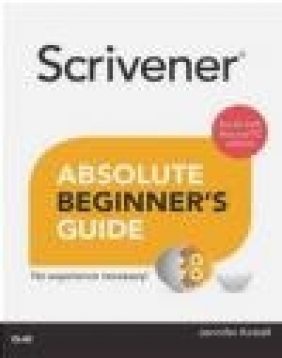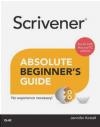Scrivener Absolute Beginner's Guide
Jennifer Ackerman Kettell
Scrivener Absolute Beginner's Guide
Jennifer Ackerman Kettell
- Producent: Que Corporation
- Rok produkcji: 2013
- ISBN: 9780789751454
- Ilość stron: 480
- Oprawa: Miękka
Niedostępna
Opis: Scrivener Absolute Beginner's Guide - Jennifer Ackerman Kettell
Far more than a word processor, Scrivener helps you organize and brainstorm even the most complex writing project, bring together your research, and write more efficiently and successfully than ever before. Long available for Mac, there's now a Windows version, too. Thousands of writers and aspiring writers are discovering this powerful, low-cost tool. Now, there's an up-to-the-minute, easy guide to the latest versions of Scrivener for both Mac and Windows: Scrivener Absolute Beginner's Guide. Written by working novelist and experienced computer book author Jennifer Kettell, this guide doesn't just present features and menus: it presents Scrivener in the context of your creative workflow, so you can make the most of this amazing software. Kettell draws on years of Scrivener experience and private tutoring to help you use Scrivener in both fiction and non-fiction projects, including screenwriting and academic writing. This book is as authoritative as it gets. Kettell not only wrote it in Scrivener: screen captures show her work in progress, and identify powerful ways to use Scrivener to improve productivity. Her book has been tech edited by the Literature & Latte software team member who serves as main liaison for the Scrivener Windows product to ensure that the Windows version is covered as thoroughly as the Mac version. You'll learn how to: * Integrate Scrivener into your own personal workflow * Get to know Scrivener's interface and customize it to your workstyle * Write, organize, storyboard, plot, and edit your document * Create custom templates to manage manuscripts, brainstorming, and research * Use keywords and metadata to keep track of complex projects * Track your progress and backing up your work * Generate a completed manuscript * Create an e-book from your manuscript * Discover new uses for Scrivener Throughout, Kettell clearly identifies differences between the Mac and Windows versions of Scrivener, so you're never frustrated by searching for a feature that isn't there. Scrivener Absolute Beginner's Guide is simple, clear, non-technical, and written from the viewpoint of a professional writer for other writers. It's the Scrivener guide thousands of writers have been waiting for.Introduction ...1 What Is Scrivener? ...2 Mac Versus Windows Versus Linux Versus iPad ...2 How This Book Is Organized ...3 Conventions Used in This Book ...4 Assumptions About Computer Knowledge ...7 Getting More Help ...7 I Getting Started in Scrivener 1 Getting to Know the Scrivener Interface ...9 Understanding Projects ...10 Creating a New Project ...10 Selecting a Project Template ...14 Saving Projects ...15 Introducing the Main Scrivener Components ...15 Examining the Editor ...16 Using the Binder...17 Opening the Inspector ...19 Changing the Group View Mode ...20 Understanding Folders Versus Files ...23 Accessing Other Panels...23 2 Customizing Your Work Environment ...27 Setting General Preferences ...28 Startup Options ...29 Saving ...29 Services (Mac Only) ...30 Separators (Mac Only) ...30 Scratch Pad ...31 Bibliography Manager ...31 Customizing Scrivener's Appearance ...32 Binder ...33 Outliner ...34 Notepad Lines ...34 General ...35 Full Screen ...35 Fonts ...36 Modifying the Color Scheme ...36 Customizing the Corkboard Appearance ...40 Appearance ...41 Fonts ...43 Dragging and Double-Clicking ...43 Setting Full Screen Composition Mode Preferences ...44 Composition Mode Setup ...45 Editing Options ...46 Composition Mode Appearance ...47 Composition Mode Customizable Colors ...47 Default View Settings ...48 Customizing the Editor...48 Editing Options ...49 Wrap to Editor Mode ...50 Wrap to Page Mode ...51 Setting a Writing Font ...53 Saving and Sharing Your Preference Settings ...55 Saving Preference Presets ...57 Saving Theme Preferences ...58 Using Workspace Layouts ...59 Creating Layouts ...61 Accessing Layouts ...62 Modifying Layouts ...63 Renaming Layouts ...63 Deleting Layouts ...64 Exporting and Importing Layouts ...64 Customizing the Toolbar ...65 3 Organizing the Binder ...69 Working with Files and Folders ...70 Adding Documents and Folders to the Binder ...73 Adding Text Documents ...74 Adding Folders ...75 Adding a Folder at the Root Level...76 Adding a File at the Root Level...77 Grouping Documents and Folders ...77 Organizing Documents and Folders in the Binder ...78 Moving Items ...79 Duplicating Items ...80 Renaming Items ...81 Deleting Items ...81 Adding Icons to Documents and Folders (Mac Only) ...82 Installing Additional Icons ...83 Restoring Original Icons ...85 Importing an Existing Manuscript ...85 Setting Import Preferences ...87 Importing Documents ...88 Splitting and Merging Files ...88 Using Import and Split ...89 Focusing on the Chapter at Hand ...90 Revealing and Hiding Items ...90 Hoisting the Binder (Mac Only) ...91 4 Writing in the Editor ...93 Examining the Editor Window ...94 Using the Header Bar ...95 Navigation History Buttons ...95 The Item Icon Menu...96 Sidebar Navigation Buttons ...98 Splitting the Screen ...98 Splitting the Editor ...99 Selecting an Item in Split Screen ... 101 Binder Affects Menu ... 101 Closing a Split ... 103 Saving Your Layout ... 103 Formatting Text and Paragraphs ... 104 Preserving Formatting ... 107 Using Formatting Presets (Mac Only) ... 107 Creating a Formatting Preset ... 108 Deleting a Formatting Preset ... 110 Accessing the Ruler ... 110 Setting Tabs ... 111 Adjusting Indents ... 112 Using the Footer Bar ... 112 Checking Spelling ... 113 Automatic Spell Checking ... 113 Manually Checking Your Spelling... 115 Automating Corrections as You Type ... 116 Adding Images to a Document ... 118 Inserting Linked Images (Mac Only) ... 119 Embedding PDF Images (Mac Only) ... 120 Viewing Scrivenings ... 120 Using QuickReference Panels (Mac Only) ... 121 Taking Notes in the Scratch Pad ... 123 Adding and Deleting Notes... 125 Sending a Note to a Project ... 125 5 Writing in Full Screen ... 127 Using Composition Mode ... 128 Making Adjustments in the Control Strip ... 130 Using Composition Mode with Multiple Displays ... 134 Using the Mac's Full Screen Mode ... 134 II Organizing Your Writing Process 6 Storyboarding with the Corkboard ... 137 Opening the Corkboard ... 138 Viewing Multiple Containers in a Stacked Corkboard ... 139 Adding Documents to the Corkboard ... 141 Examining Index Cards ... 142 Adding Index Card Options ... 143 Setting Corkboard Options on the Footer Bar ... 145 Using the Corkboard in Split Screen ... 146 Putting Split Screen to Work ... 148 Using Images to Your Advantage ... 150 Locking the View Mode (Mac Only) ... 152 Working with the Freeform Corkboard (Mac Only)... 152 Printing Index Cards ... 155 7 Plotting in the Outliner ... 161 Exploring the Outliner ... 162 Customizing the Outliner ... 163 Expanding and Collapsing Containers ... 163 Adding and Removing Columns ... 164 Arranging Columns and Items ... 167 Hiding the Synopsis ... 168 Sorting by Outliner Columns (Mac Only) ... 168 Printing an Outline on the Mac ... 170 Exporting an Outline ... 173 Exporting to a Spreadsheet (CSV Format) ... 173 Exporting to OPML Format... 174 Importing an OPML or Freemind Outline ... 177 8 Organizing Your Research ... 181 Importing Research Files ... 182 Using File Import ... 182 Opening Files in an External Editor ... 183 Linking to an Alias ... 185 Using PDFs ... 188 Accessing Media Files ... 189 Importing Web Pages ... 190 9 Brainstorming with Scrivener ... 193 Using the Name Generator ... 194 Searching for Names on the Mac... 194 Adding Names to the Mac Name Generator ... 196 Searching for Names in Windows ... 198 Adding Names to the Windows Name Generator ... 201 Creating a Sketchpad ... 202 Using Aeon Timeline with Scrivener (Mac Only) ... 205 10 Editing Your Manuscript ... 211 Using Inline Annotations ... 212 Adding Annotations ... 212 Editing Annotations ... 213 Changing the Appearance of Annotations ... 214 Adding and Reviewing Comments ... 217 Adding Comments ... 217 Editing Comments ... 218 Changing the Appearance of Comments ... 219 Moving Comments ... 219 Removing All Document Notations ... 220 Converting Annotations to Comments (and Vice Versa) ... 221 Searching for Annotations and Comments ... 222 Exporting Annotations and Comments ... 223 Using Revision Mode (Mac Only) ... 223 Marking Text ... 224 Marking Text for Deletion ... 226 Customizing Revision Mode ... 226 Finding Revisions ... 227 Removing Revisions ... 228 Taking Snapshots ... 229 Creating Snapshots ... 229 Viewing Snapshots ... 230 Comparing Snapshot Versions (Mac Only) ... 232 Reverting to a Prior Snapshot ... 233 III Digging Deeper into Scrivener 11 Digging into the Inspector ... 237 Navigating the Inspector ... 238 Adding a Synopsis in the Inspector ... 239 Automatically Generating a Synopsis ... 240 Adding an Image to the Synopsis ... 241 Toggling the Created and Modified Date ... 242 Selecting Compile Settings ... 242 Adding Project and Document Notes ... 243 Adding Images to Notes ... 244 Managing Project Notes (Mac Only) ... 246 Using Reference Links ... 247 Adding Internal References ... 248 Adding Internal References to the Item Icon Menu (Mac Only) ... 249 Adding External References ... 250 Viewing References ... 251 Editing and Deleting References ... 252 Locking the Inspector ... 253 12 Putting Keywords and Meta-Data to Work ... 255 Setting Status and Labels ... 256 Changing the Label and Status Titles ... 256 Removing Status and Label Values ... 259 Adding Status and Label Values ... 260 Setting a Default Status or Label ... 262 Associating Color with Labels ... 262 Applying Label Color to Interface Elements ... 264 Applying a Status Stamp to Index Cards ... 266 Using Glyphs as a Status Stamp on the Mac ... 266 Adding Glyphs as a Status Stamp in Windows... 268 Using Keywords... 270 Viewing the Keywords Inspector Pane ... 271 Adding Keywords to Documents ... 271 Removing Keywords from a Document ... 272 Using the Keywords Panel ... 272 Organizing Project Keywords ... 274 Searching by Keyword ... 274 Deleting Keywords from a Project ... 276 Adding Custom Meta-Data (Mac Only) ... 276 Adding Fields ... 277 Adding Values ... 279 Deleting Custom Meta-Data Fields ... 280 13 Creating and Using Template Sheets ... 283 Using Predesigned Template Sheets ... 284 Changing the Template Folder ... 285 Modifying Template Sheets ... 285 Creating a Document from a Template ... 287 Creating Your Own Template Sheets ... 288 Setting a Default Document Type ... 290 14 Creating and Using Project Templates ... 293 Creating a Project to Build a Template ... 294 Developing a Good Template ... 295 Create a Workspace Layout ... 296 Set Up the Draft Folder ... 296 Add or Modify the Information File ... 297 Create Non-Draft Folders and Files ... 297 Set Default Meta-Data ... 300 Set Project Targets ... 301 Create Template Sheets ... 301 Create Initial Collections ... 302 Designate Compile Settings ... 303 Using Template Placeholder Tags (Mac Only) ... 303 Saving a Project Template ... 306 Modifying a Project Template ... 307 Setting a Default Project Template ... 308 Deleting a Project Template ... 308 Importing and Exporting Project Templates ... 309 Importing a Project Template ... 310 Exporting a Project Template ... 311 IV Managing Your Writing Projects 15 Tracking Your Progress ... 313 Using Project Targets ... 314 Setting Target Options (Mac Only) ... 315 Setting Draft Targets ... 319 Setting Session Targets ... 320 Resetting Target Sessions ... 320 Using Document Targets ... 321 Using Project Statistics ... 323 Viewing Word Frequency ... 325 16 Searching Your Project ... 329 Conducting Project Searches ... 330 Narrowing Project Search Results by Element ... 331 Limiting Project Searches with Operators ... 332 Narrowing Search Options ... 333 Using Project Replace ... 334 Using Document Find and Replace ... 336 Performing a Document Find ... 336 Using Document Replace with Document Find... 338 Using the Find Synopsis Tool (Mac Only) ... 338 Searching by Format ... 340 Creating and Using Collections... 342 Creating a Standard Collection ... 343 Adding and Removing Files from Standard Collections ... 346 Moving Files in a Standard Collection ... 347 Creating a Search Collection ... 348 Converting a Search Collection to a Standard Collection... 349 Renaming Collections ... 349 Removing Collections ... 349 Toggling the Collection View ... 349 Setting Bookmarks (Mac Only) ... 350 Adding Bookmarks ... 350 Using Bookmark Headers for Navigation ... 351 Choosing Favorites (Mac Only) ... 352 17 Backing Up Your Work... 355 Setting Backup Preferences ... 356 Backing Up to Dropbox ... 359 Excluding a Project from Automatic Backups ... 361 Performing Manual Backups ... 361 Backing Up to Time Machine or Windows Backup ... 364 Restoring from a Backup ... 364 18 Taking Scrivener Out and About ... 367 Using Scrivener on Multiple Computers ... 368 Using Dropbox to Access Your Scrivener Project ... 369 Syncing Your Project (Mac Only) ... 371 Using Files in the External Folder ... 375 Working Wisely with Synced Folders ... 376 Using iPad Apps with Scrivener Files (Mac Only) ... 376 Using iA Writer with Scrivener Files (Mac Only) ... 377 Using Index Card for iOS (Mac Only) ... 380 V Generating a Completed Manuscript 19 Compiling Your Completed Work ... 387 Understanding the Compile Process ... 388 Choosing a Compile Format... 389 Selecting an Output Format ... 391 Compiling the Project Using Compile Presets ... 394 Using the Compile Window ... 396 Choosing the Contents to Compile ... 397 Selecting Items in the Compile Group ... 399 Filtering the Contents of a Compile Group (Mac Only) ... 400 Adding Front Matter (Mac Only) ... 402
Szczegóły: Scrivener Absolute Beginner's Guide - Jennifer Ackerman Kettell
Tytuł: Scrivener Absolute Beginner's Guide
Autor: Jennifer Ackerman Kettell
Producent: Que Corporation
ISBN: 9780789751454
Rok produkcji: 2013
Ilość stron: 480
Oprawa: Miękka
Waga: 0.74 kg

































